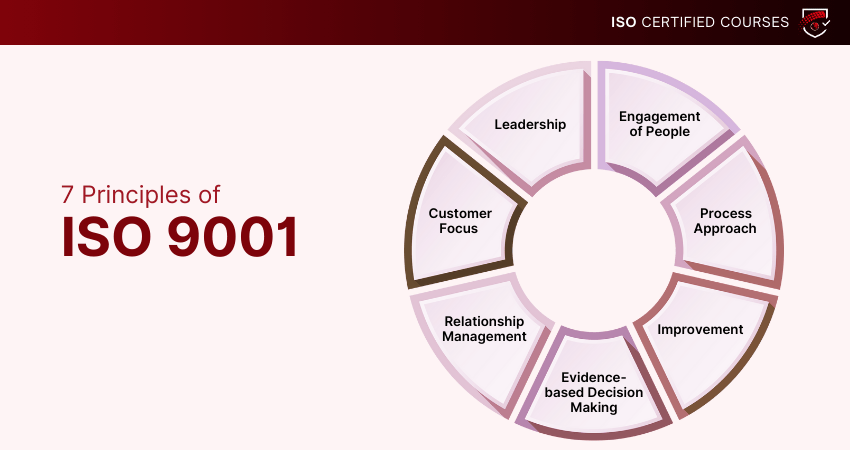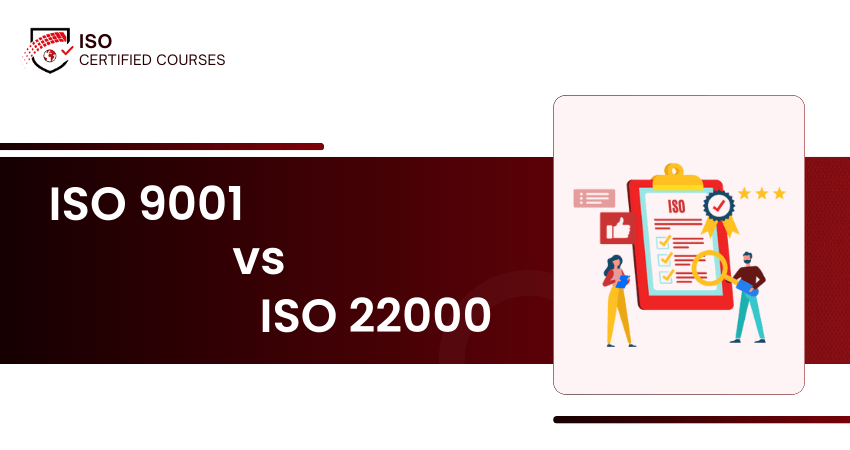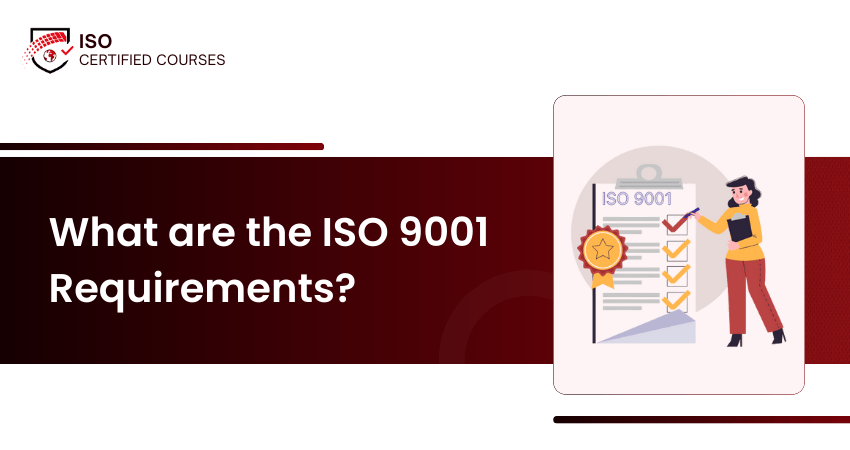We’ve all been happy when a company gave us great service or a product that worked perfectly. It happens because businesses follow clear rules that make sure quality is always the same. These rules are called the ISO 9001 Principles, and they help companies keep customers happy every single time.
In this blog, we’ll explain the seven ISO 9001 Principles, from customer focus and leadership to improvement and Relationship Management. You’ll also learn about the benefits of ISO 9001 and how it can help any business grow stronger and earn trust.
Table of Contents
1) Introduction to ISO 9001
2) What are the Seven Principles of ISO 9001?
a) Principle 1- Customer Focus
b) Principle 2 - Leadership
c) Principle 3 - Engagement of People
d) Principle 4 - Process Approach
e) Principle 5 - Improvement
f) Principle 6 - Evidence-based Decision Making
g) Principle 7 - Relationship Management
2) Benefits of ISO 9001 Principles
3) Conclusion
Introduction to ISO 9001
The ISO 9001 Standard is part of the ISO 9000 Quality Management standards. The latest version is ISO 9001:2015, which explains all the rules needed to build a good Quality Management System (QMS). This system helps businesses to:
1) Give customers what they need by keeping the quality the same in all products and services.
2) Keep improving to make customers happier.
3) Work more efficiently in daily tasks and processes.
4) Win more contracts and projects, which brings more income.
5) Use clear and simple processes to save money, reduce mistakes, and improve work.
What are the Seven Principles of ISO 9001?
The ISO 9001 framework is built on seven basic Quality Management Principles. These principles are explained in detail below.

Principle 1- Customer Focus
Your business should always put customers first. This shows that you care about quality. Ask customers for feedback, whether it is good or bad. This will help you find problems, fix them, and make your work better.
Benefits of focusing on customers:
a) Customers will keep coming back
b) People will trust your business more
c) You can keep good business relationships
d) Your sales and market share will grow
Along with customers, you should also care about other people, like owners, workers, suppliers, investors, and the local community.
Principle 2 - Leadership
Every business needs good leaders. Leaders should have a clear plan and guide the team to follow it. They should also make the workplace positive, so people feel happy and motivated. Leaders must teach new employees to follow the same values.
Benefits of good leadership:
a) Everyone works towards the same goals
b) Employees feel happy and supported
c) Work gets done faster and better
d) Problems are solved more easily
Good leadership from the beginning saves time and helps the business grow
Understand how to implement and manage Quality Management Systems. Join our ISO 9001 Lead Implementer Training now!
Principle 3 - Engagement of People
A company does well when all workers are involved. Everyone should feel important and know how their job helps the company. When people feel valued, they work better and give good ideas.
Benefits of engaging people:
a) Everyone knows the company’s goals
b) Workers feel happy and motivated
c) People share ideas to improve work
d) Skills grow, and workers feel more confident
When everyone is included, the company becomes stronger and more successful.
Principle 4 - Process Approach
A business runs better when clear steps are in place. Simple processes in areas like sales, marketing, finance, and HR prevent confusion, reduce mistakes, save money, and keep results consistent, even if key staff leave. This also frees up time for important tasks.
Benefits of a process approach:
a) The work is clear and organised
b) Less stress when changes happen
c) It saves money and reduces waste
d) Results are steady and reliable
All these make the business run smoothly and grow stronger.
Principle 5 - Improvement
A business should always try to get better. This means looking for problems, fixing them, and making changes that help the company grow. Feedback and regular checks make it easier to improve all the time.
Benefits of improvement:
a) Business becomes stronger step by step
b) Customers stay happy as things improve
c) The company can handle changes more easily
d) Problems are fixed at the root, so they don’t happen again
Continuous improvement keeps the business ready for the future and helps it stay successful.
Principle 6 - Evidence-based Decision Making
A business should decide things using real facts, not guesses. This means collecting correct information, checking it, and then using it to choose what to do.
Benefits of evidence-based decisions:
a) Decisions are clearer and correct
b) It is easier to know if goals are reached
c) Work becomes easier and smoother
d) Past decisions can be checked and improved
Using true information helps the business make smart choices and keep improving.
Principle 7 - Relationship Management
A business should build strong and trusting relationships with suppliers and other partners. Good relationships are not only about quick profits but also about long-term success for everyone.
Benefits of Relationship Management:
a) Shared goals and values
b) More efficient supply chain management
c) Reduced risks through information sharing
d) Faster response to opportunities and challenges
Good partnerships create success for both the business and its partners.
Learn auditing principles, processes, and techniques for effective Quality Management. Join our ISO 9001 Lead Auditor Course now!
Benefits of ISO 9001 Principles
Using the ISO 9001 helps both your business and your customers. These are the benefits of ISO 9001 Principles:

1) The business works in a clear and organised way
2) Resources like time and money are used better
3) Customers get good quality products and services
4) Employees feel valued, trusted, and motivated
5) Decisions are based on real facts, not assumptions
6) Problems are found and solved quickly
7) The business earns trust and a good reputation
8) The company has grown stronger and more successful over time
Conclusion
The ISO 9001 Principles help businesses build a strong base for quality, trust, and success. They focus on customers, leaders, employees, processes, improvement, facts, and relationships. By following these principles, companies can work better, grow stronger, keep customers happy, motivate workers, and build a good name. ISO 9001 is a key tool for growth and lasting success.
Improve customer satisfaction and loyalty effectively with our ISO 9001 Training. Join now!
Search Smarter
Quickly search through our blog content for what interests you








































